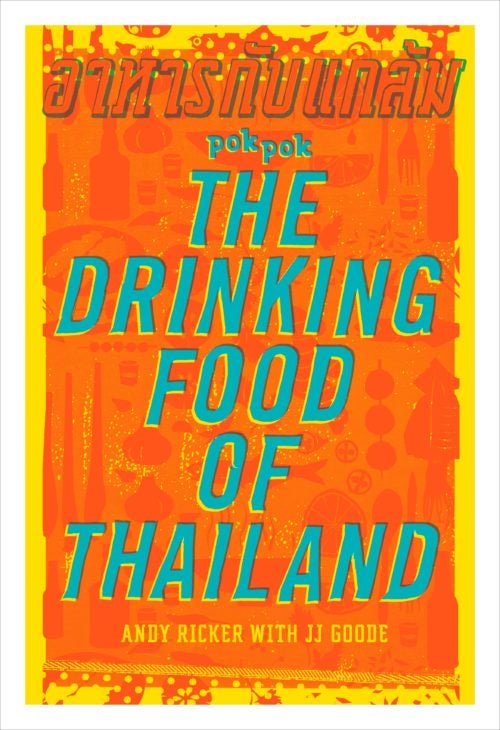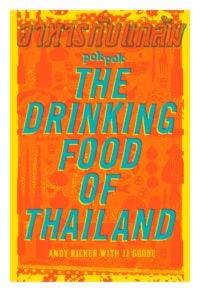





























Pok Pok Drinking Food of Thailand delves into the country’s extensive bar snacks and late night munchies with Andy Ricker.
Of all of Thailand’s drinking food, phat khii mao is perhaps the only dish named for its purpose. The literal translation is “drunkard’s stir-fry.” The explanations for this title vary. Some say a drunk man invented the dish, his hunger inspiring its late-night, raid-the-fridge composition—justas my buddy Adam (who edited the photos in this book) and I, as pissed lads, used to throw together pasta, peanut butter, celery, and chile that we found when we raided his roommate’s fridge late at night. Others claim the name comes from the aggressive seasoning meant to tear through the dulled palates of the inebriated. Whatever the reason, phat khii mao became quintessential boozer grub—fiery and salty enough to encourage another round.
Directions
- Cut the rib racks into individual riblets. Put the ribs in a large pot, fill the pot with cold water, and stir and rub the ribs with your hands. Drain the ribs well. Wipe out the pot, return the ribs to it, and add water to cover the ribs by 1 inch / 2.5 cm or so. Bring the water to a simmer over high heat, then turn off the heat. Skim any scum from the surface, then drain the ribs in a colander and rinse them under running warm water. All of this will rid the ribs of any blood, excess fat bits, and effluvium, which will give you a cleaner-tasting, clearer stock.
- Clean the pot, then return the ribs to it and add the water. Bring the water to a rolling simmer over high heat. Cover the pot, turn down the heat to low, maintain a gentle simmer, and cook for 30 minutes.
- Meanwhile, using a pestle, a pan, or the flat surface of a knife blade, lightly whack the garlic and ginger to smash them slightly. Put the garlic, ginger, radish, yellow onion, cilantro roots, green onions, celery, and peppercorns on a large piece of cheesecloth, gather the edges around the aromatics, and tie with kitchen twine to secure the bundle. After the ribs have been simmering for 30 minutes, add the bundle and the salt. Re-cover the pot, let the water return to a rolling simmer, and cook until the pork is tender but not falling off the bone, about 30 minutes more.
- Discard the cheesecloth bundle. If not using right away, let the stock and meat cool, then transfer to an airtight container and keep in the fridge for up to 4 days.
- Combine the garlic and red Thai chiles in the mortar and pound just until the garlic is in small pieces and you have a slightly wet-looking mixture (not a paste), about 15 seconds. Set aside 12 g / 1 tablespoon for this dish. Reserve the remainder for another purpose.
- Combine the peppercorns, krachai, long green chiles, long red chiles, and bruised green Thai chiles in a small bowl. In a separate small bowl, combine the oyster sauce, fish sauce, soy sauce, liquor, and sugar and stir until the sugar dissolves.
- Heat the wok over medium heat, add the oil, and swirl the oil to coat the sides of the wok. When the oil smokes lightly, add the garlic-chile mixture and remove the wok from the heat. Cook off the heat, stirring constantly and quickly, until the mixture is fragrant but has not taken on color, 30 seconds to 1 minute. Do yourself a favor and avoid taking too deep or too close a sniff.
- Put the wok back on the heat, turn the heat as high as it will go, and add the meat. Stir-fry (constantly stir, scoop, and flip the ingredients) for 30 seconds. Add the peppercorn-chile mixture and stir-fry for 30 seconds. Add the onion, long beans, and baby corn and stir-fry for 15 seconds. Add the oyster sauce mixture, stir well, and then add the stock. Stir-fry until the liquid comes to a boil, about 30 seconds. Turn off the heat, immediately add the basil, and stir well.
- Transfer to a plate and serve right away.
Reprinted with permission from Pok Pok Drinking Food of Thailand, copyright © 2017 Andy Ricker and JJ Goode. Published by Ten Speed Press, an imprint of Penguin Random House LLC.

